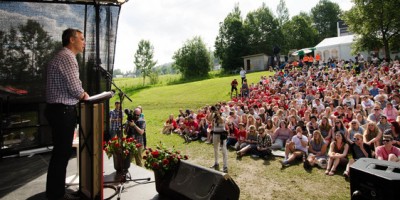Around 800 young members of Norway’s Labour Party are reconvening this week for their annual summer camp that was the target of a lone terrorist three years ago. They’re gathering again at Gulsrud on the Tyrifjord, not far from the island of Utøya where the terrorist unleashed his massacre, with a program aimed at both moving forward and remembering the tragedy.

“We get the good summer camp feeling at Gulsrud, but there’s something special about Utøya,” 22-year-old Andreas Brandt, county leader for the Labour youth organization AUF in Buskerud, told newspaper Dagsavisen. He and many other AUF members said they look forward to return to Utøya next summer, despite ongoing controversy over Utøya’s future.
Another memorial will be held on the island on July 22 later this month, the third anniversary of the attacks that left 69 campers dead. Another eight people were killed in the terrorist’s bombing earlier that same day of Norway’s government headquarters in Oslo, which was under Labour Party control at the time. A memorial will be held there as well on Tuesday July 22, attended by, among others, current government officials, Labour leaders and survivors of the attacks.
Støre speaking Saturday
Meanwhile, the young Labour members will gather through Sunday at Gulsrud, with full programs every day of speeches, meetings, debates, concerts, sports activities and just plain fun. New Labour Party leader Jonas Gahr Støre, the party’s candidate for prime minister, was scheduled to address the group on Saturday and several other top Labour Party politicians including Anniken Huitfeldt and Hadia Tajik will be speaking on everything from foreign affairs to extremism.
Among the events planned for Thursday was a workshop entitled “The Restoration of Utøya,” along with other a debate on the Israeli-Palestinian conflict in the Middle East, a session on international politics, a workshop on child welfare in Norway and, later in the evening, karaoke and stand-up comedy. It’s important for the 800 campers, roughly half of whom did not experience the tragedy on Utøya, to make the camp fun as well as serious.
Eskil Pedersen, AUF’s outgoing leader who escaped the mass murder on Utøya, said it’s also important that there’s no division between those who experienced the Utøya tragedy and those who didn’t. “After July 22 (2011), we’ve had an enormous increase in membership,” Pedersen told Dagsavisen. “It’s important that the new members don’t feel like a ‘B-team’ alongside an ‘A-team.’ We want to create a culture in AUF where everyone is involved.”
Carrying on tradition
The most important thing, Pedersen said, is that AUF continues its summer camp tradition, “so that we don’t have a generation of members who haven’t been to camp.” He recently retreated from earlier-announced plans to tear down a café building on Utøya where many campers were killed. Discussions continue with all the groups involved who have different opinions on whether Utøya should be preserved or used.
Next year’s camp will be held back on Utøya despite the ongoing conflicts over redevelopment and over planned construction of a national memorial on the island. Brandt said he was eager to take part in this year’s camp at Gulsrud, as part of the process of “slowly but surely” returning to AUF traditions. “This is part of a process for the organization and the whole country,” Brandt said.
newsinenglish.no/Nina Berglund

